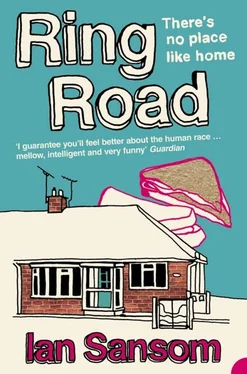‘I’d be grateful, if you would.’
Davey got out. The cars on the inside lane were inches from him, flank to flank, and the rain was busy pasting his clothes to him, and the wind was getting up, turning him instantly from safe passenger into a sailor rolling on the forecastle in the high seas.
He checked first round the front. The whole of the wiper’s arm had gone – just the metal stump remained – so he then made his way round to the rear and started pulling off the back windscreen wiper, in the hope he might be able to use it as a replacement. He managed to cut his hands on the fittings and the spray from the road was whipping up his back, but in the end, with a twist and a wrench, he managed to get the wiper off. And in so doing he dropped the little plastic lugs that had held it in place – they rolled on to the road – so there he was, big Davey Quinn, not an hour back home, down on his knees, soaked to the skin in the pouring rain, reaching out a bloodied hand into a sea of oncoming traffic.
It was no good. They were out too far and the traffic was too heavy. He gave up. He got back into the back seat, drenched, defeated, and dripping wet and blood.
The driver was smoking. ‘Good swim?’ he asked, chuckling at his own joke. ‘No luck?’
‘No.’ Davey reached forward and gave the driver the back wiper. ‘Sorry about that.’
‘You’re all right.’
The driver called into his office on the radio. They’d send someone along with a spare. It might take a while, maybe an hour or so.
An hour.
Davey thought about it.
Davey had been thinking about coming home for as long as he’d been away – there was not a day went past when he didn’t think about it – but it was a journey in which irresolution might still easily overtake him. He had enough money in his wallet and on his cards to be able to go back to the airport right now and get the next plane out, and maybe wait another twenty years before returning. He was, therefore, a man who could not afford to hesitate.
The time was now or never.
He’d come this far: he was going to have to keep going. He was going to have to maintain his velocity.
He said he’d walk the rest of the way.
‘Walk?’ said the driver.
‘Yeah,’ said Davey.
‘As in, on your feet?’
‘Yeah,’ repeated Davey.
‘Walking? In this rain?’
‘Yes,’ said Davey one more time.
‘Are you joking?’
‘No. It’s not far from here, is it?’
‘Next exit. He won’t be long, though, with the spare.’
‘No, I’ll push on, I think.’
‘Well, it’s your decision, pal. What’s the hurry?’
‘I just …’ Davey couldn’t explain it. ‘I need to get back. What do I owe you?’
‘Well, I’ll have to charge you full fare and extra for the damage to the wiper.’
‘Right,’ said Davey. He believed him.
‘No, I’m having you on!’ said the driver. ‘Jesus! Where have you been?’
‘London,’ admitted Davey.
‘Well,’ said the driver philosophically. ‘I’ll tell you what. This isn’t London. We’ll call it quits. OK?’
‘OK,’ said Davey. ‘Cheers.’ People at home, he thought: they were the salt of the earth.
‘Happy Christmas,’ said the man as Davey slipped out. ‘And good luck.’
Davey had made it about half a mile and halfway down the slip road in the squall and rain before he realised that he’d left his little rucksack, his only hand luggage, in the car.
The rucksack contained a bottle of whiskey for his parents, a bottle for himself and his wallet, stuffed with cash and cards.
He turned and walked back towards the car, in the face of the traffic spitting up fountains in his face.
The car had gone – there was just a wiper on the hard shoulder to mark where once it had been.
So this was how it was going to have to be. He was going to have to return, as he had left, with nothing and in ruin.
He put one foot in front of the other and set off in the wake of the cars’ slipstream.
It’s a long walk from the motorway to the outskirts of our town – an hour, maybe two, I’m not sure, it’s not a walk I’d care to take myself – but eventually in the distance, on that profound horizon, Davey saw the golf club, the outskirts, with its big stone sleeping lions and its 20-foot forbidding hedges, and there was probably a good half-inch of water in his shoes by this time, and his clothes were like wet canvas as he stood and rested his hand on the head of one of the lions and gazed at the entire grey town down below him.
A lot can change in a small town in twenty years. In twenty years men and women can do a lot of damage. There is no mildness in the hearts of small-town councillors and planners, and you should never underestimate what small-town people are capable of. You can double it and double it again, and keep on going with your calculations until you think you’ve achieved the unimaginable, and still you’d never come close. Any estimate will never match up to the extraordinary outstretched reality.
The people of my home town have outdone themselves. We have exceeded all expectations. We have gone further than was absolutely necessary. We have confounded probability and ignored all the maths. We have been reckless and we have been greedy, we have eaten ourselves alive, sucked the very marrow from our bones, and spat out the remaining pieces.
Davey was amazed. He was heading straight for the centre of town, past all the old landmarks – Treavy’s second-hand cars, Pickering’s the monumental masons, McKenzie’s broom factory and the old planing mill, where they used to stack the sashes and doors outside under a huge tarpaulin canopy, and J. W. John’s, the big coal depot, where the coal would sometimes fall over the wall, and we’d go to collect it and bring it home, or dig pits in the woods and gather kindling and try to make fires.
They’re all gone, of course – Treavy’s, Pickering’s, McKenzie’s, John’s. There is nothing of them remaining at all. It’s been quite a clearance. Even the long steep road Davey was coming in on, shin-deep in mud and puddles, what used to be Moira Avenue, a mazy S-shaped road flanked with trees and the cast-iron railings protecting the town’s little light industry, is now a straight flat dual carriageway with housing developments tucked up tight behind vast sheets of panel fencing on either side, a good quarter of a mile of soft verges and For Sale signs.
At the very end of the road, a road Davey no longer recognised but which he now alas knew, every foot-aching inch of it, at a big new junction with four sets of lights where the water had formed in deeper puddles, was the Kincaid furniture factory. Or rather, was the Kincaid furniture factory. There’s nothing there at all now. Just mud, and sprouting weeds, and a sign, ‘COMING SOON: EXCITING NEW DEVELOPMENT OF TWO AND THREE BED HIGH-SPEC TURNKEY FINISH TOWN HOUSES’, with a high-spec view, it should be noted, of the health centre car park, Macey’s the chemists, and Tommy Tucker’s chipper, which have all survived the clearances.
Molested by the remorseless rain, Davey Quinn waited for the little green man to tip him the wink, then he crossed over into the centre proper.
The old fire station is still there, but it has been converted into apartments – ‘LUXURY, FULLY FITTED APARTMENTS’, apparently, and two of them still for sale. The big tower where you used to see the long red hose hanging down to dry – what we called God’s Condom – is long gone.
Some things, though, remain. Down Bridge Street, past the bus station and the train station and the Chinese takeaways, the old Quality Hotel, our landmark, our claim to fame, still sits on the corner of Main Street and High Street, in all its glorious six storeys, with its balustraded parapet, its castellations and gables, its mullioned windows and square corner turrets, and its flat-roofed concrete back-bar extension and basement disco, the site of so many breathless adolescent fumbles and embraces, a place where so many relationships in this town were formed and celebrated, and where so many of them faltered.
Читать дальше












